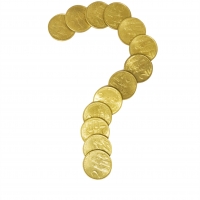Is Bitcoin Digital Currency REAL Money?

When shares of the digital currency Bitcoin recently jumped over the $100 mark, many people were left scratching their heads. What’s a Bitcoin?
Introduced in 2009 by a pseudonymous developer (or group of individuals) named Satoshi Nakamoto, Bitcoins (BTC) are termed open source crypto-currency. The system is complicated or elegantly simple. It depends on your point of view.
Bitcoins are not backed by a government, central bank, or the FDIC. They’re generated by computer code and part of the e-commerce ecosystem. However, there is a hard limit of about 21 million Bitcoins. If you’re interested in the details, I highly recommend “going down the rabbit hole” and reading the original paper describing the Bitcoin system's design or the Bitcoin wiki.
According to Bitcoin:
Building upon the notion that money is any object, or any sort of record, accepted as payment for goods and services and repayment of debts in a given country or socio-economic context, Bitcoin is designed around the idea of a new form of money that uses cryptography to control its creation and transactions, rather than relying on central authorities.
It’s a concept that more people are paying attention to, but even financial experts sometimes stumble trying to explain, such as in this video on Bloomberg Television's "Street Smart” where Bloomberg's Clive Crook and Paul Sweeney attempt to explain Bitcoin.
Is Bitcoin really currency? Is it legal?
Yes. In March 2013, the Financial Crimes Enforcement Network, the bureau of the U.S. Department of the Treasury that collects and analyzes information about financial transactions in order to combat financial crimes, issued guidelines on virtual digital currencies: Application of FinCEN’s Regulations to Persons Administering, Exchanging, or Using Virtual Currencies.
Media outlets such as Fox News reported that at the end of March 2013 Bitcoins valued at more than one billion dollars were in circulation, “an amount that exceeds the value of the entire currency stock of small countries like Liberia (which uses ‘Liberian dollars’), Bhutan (which uses the ‘Ngultrum’), and 18 other countries.”
Is the bubble about to burst?
Forbes’ contributor Timothy B. Lee, who owns Bitcoins and terms himself “generally a Bitcoin fan,” offers an analysis and “Four Reasons You Shouldn't Buy Bitcoins."
According to TechCrunch, "Two years ago, if you’d have told me that an open-source, P2P currency would soon be a thriving, billion-dollar market, I would’ve told you that you were on a lonely bus headed to CrazyTown, U.S.A. But today, Bitcoin officially became a crazy idea that’s actually working.”
“We’ll have to wait and see,” writes Barron’s, Ben Levisohn.
Over the years, currency has taken many forms. Cowries, or mollusk shells, were used in China in 1200 B.C. In The Flintstones, Fred and the gang used clams.
Some think the move to digital money as our future currency is inevitable.
What do you think?

